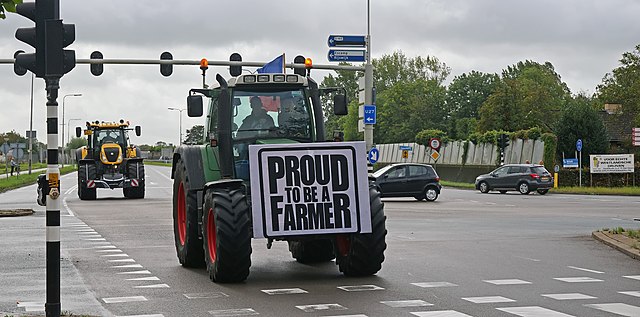Angry farmers in Germany used tractors to block roads in opposition to Berlin's plans to cut tax breaks for agriculture, initiating a series of strikes that are expected to worsen the country's ongoing unrest. The government has expressed a desire to cut important benefits such as fuel and taxes to the agricultural sector in an effort to solve Germany's major budget crisis.
In Berlin, numerous tractors and trucks in the city center honked their horns to express their anger as they launched a planned week of protests. Farmers began assembling at the Brandenburg Gate in Berlin on Sunday evening. These protests led to road blockages in cities like Berlin, Hamburg, Cologne, and Bremen, with up to 2,000 tractors participating in each demonstration. Demonstrators outside of cities targeted highway access ramps, causing nationwide traffic disruptions.
The protests also caused delays at Germany's borders with France, Poland, and the Czech Republic. In December, thousands of protestors had already descended on Berlin to oppose subsidy cuts, obstructing roads, and staging protests with manure.
German farmers and the government can take notes from farmer protests elsewhere in the world over the last few years.
The India Farmer Protest (2020-2021) saw farmers protesting against three agricultural reform laws passed by the government, fearing that they would adversely affect their income and bargaining power.
In 2019, American farmers faced trade disputes and tariffs that affected their exports, particularly with China. They called for resolution and financial assistance. The U.S. government provided financial aid to farmers affected by trade tensions, but the issues persisted, and some farmers continue to face challenges related to trade.
French farmers protested in 2018 against low prices for agricultural products, demanding better income and government support. The protests led to some concessions and financial aid from the French government, but the issue of farmers' income sustainability remains a challenge.
In 2017, South African farmers protested against farm attacks and murders, seeking improved safety measures. The protests raised awareness about the issue, leading to discussions and efforts to address farm attacks, although challenges remain there as well.
What German farmers and the government can learn from these past incidents is that the success or failure of a protest can vary depending on factors such as government response, public support, and the protesters' ability to sustain their movement. The outcomes of these protests can also be multifaceted, with partial success achieved on some demands while others remain unmet.
In general, governments can and should come to an agreement with farmers and others in the agricultural sector as this is one of the most important sectors in most countries and it is crucial to ensure that farmers are capable of sustaining output while affording to live.
With this in mind, farmers and governments can achieve mutually beneficial agreements through open, inclusive, and transparent communication. This begins with creating channels for dialogue that encompass all relevant stakeholders, including farmers' unions, agricultural experts, and relevant organizations. To bridge understanding gaps, both parties must actively listen and empathize with each other's perspectives while relying on credible data and research to inform their discussions. In some cases, neutral third-party mediators or facilitators can help manage the negotiations fairly.
Clear definition of goals, demands, and priorities is crucial, enabling negotiations to focus on the most critical issues. Flexibility and compromise play pivotal roles in reaching agreements that address concerns from both sides. Governments should be prepared to revise policies, provide financial support, and create incentives to assist farmers and promote sustainable practices. Timely implementation, regular reviews, and public education efforts would further solidify the success of these agreements, ultimately contributing to the long-term sustainability of the agricultural sector. Establishing conflict resolution mechanisms ensures disputes are effectively addressed throughout the implementation process, fostering a constructive and cooperative relationship between farmers and governments.





